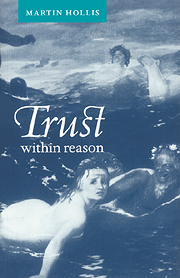3 - The centipede's sting
Published online by Cambridge University Press: 06 January 2010
Summary
In Condorcet's vision, the moral and political sciences will advance partly by learning more of how human beings tick and partly by developing a technical and precise ‘social mathematics’. The unity of this enterprise depends on human nature and social mathematics being made for one another – an assumption challenged by the problem of trust. His current heirs commonly put their faith in a theory of expected utility, which encapsulates a schematic, universal account of human nature in a way suited to a theory of rational choice, including game theory, in all its elegant technicality and precision. For the purposes of this book, that means being clear what is involved, when prudence bids us make strategic choices as game theory recommends. The last chapter left some loose ends by being vague about the notion of utility and so about instrumental rationality. This one will tidy up by defining these notions more exactly and relating them to the assumptions of game theory. Whether prudence can advise us to be trustworthy depends in part on the game-theoretic implications of being prudent. Meanwhile, we are still looking for a defensible definition of reason which makes it rational to trust rational people.
Let us start with the idea of instrumental rationality. The broad idea so far has been that action is the product of the agent's beliefs and desires, and is directed to securing what the agent most wants, all things considered. Practical reasoning arrives at a rational choice of an action, or course of action, by comparing alternatives to see how completely they are likely to secure what the agent wants.
- Type
- Chapter
- Information
- Trust within Reason , pp. 44 - 62Publisher: Cambridge University PressPrint publication year: 1998



